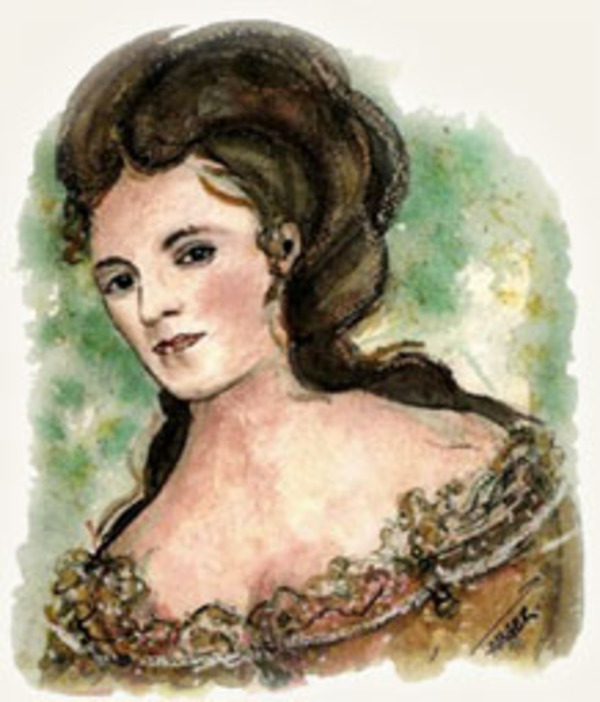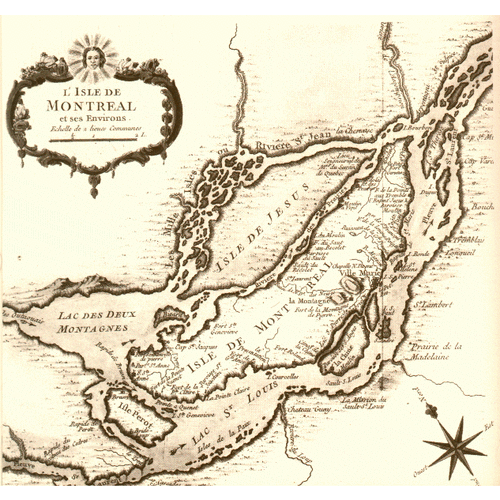
Source: Link
SAINT-PÈRE, AGATHE DE (Legardeur de Repentigny), manufacturer; b. 25 Feb. 1657 in Montreal, daughter of Jean de Saint-Père*, a notary, and Mathurine Godé; d. in 1747 or 1748 in Quebec.
Agathe de Saint-Père belonged to a family of renowned colonists of Ville-Marie. Her father, her grandfather Nicolas Godé, and her godfather Raphaël-Lambert Closse*, were killed by the Iroquois. In 1658 her mother, some months after she had been widowed, married the merchant Jacques Le Moyne de Sainte-Marie; Agathe de Saint-Père thus entered a family whose name was made famous by the exploits of Charles Le Moyne* de Longueuil et de Châteauguay, brother of Jacques, and his sons.
Agathe de Saint-Père probably attended Marguerite Bourgeoys*’s school, as her Le Moyne half-sisters did. In 1672, after her mother’s death, Agathe, who was barely 15, took over the raising of the ten Le Moyne children, the youngest of whom was a new-born baby. She seems to have brought these children up firmly and to have retained responsibility for them even after her marriage, on 28 Nov. 1685, with the ensign Pierre Legardeur* de Repentigny. A son and seven daughters were to be born of her marriage.
Legardeur’s easy-going nature allowed the dynamic Agathe de Saint-Père to outshine her husband frequently. She signed contracts, made profits on fur-trading licences, bought and sold land, made loans, and settled her accounts as well as the debts of her husband and her brothers-in-law. In 1701 she opposed the marriage of her half-brother, Nicolas Le Moyne de Leau, with a commoner. Together with Catherine Le Moyne de Sainte-Marie, her half-sister, she successfully took legal action to prevent the marriage. Nicolas left the colony for the Mississippi country, never to return; he had given Agathe power of attorney.
At the beginning of the 18th century the economic situation forced the colony periodically to manage on its own resources; such an economy was, indeed, a return to the ideas Intendant Jean Talon* had advanced during his two periods of service in New France. To make up for the shortage of linen and wool, Mme de Repentigny experimented widely, especially with nettles and bark fibres, cottonweed, and the woolly hair of the buffalo. The king considered that her samples of cloth were successes and enjoyed the maple-sugar candy of her own making that she sent him. In 1705, when news arrived of the shipwreck of the Seine, which was bringing supplies for a whole year, the daring woman set up in her house “a factory to make linen, drugget, twilled and covert-coating serge.” She ransomed nine English weavers who were prisoners of the Indians, hired them, and assigned Canadian apprentices to assist them. She put at their disposal and distributed about Montreal looms that she had had made from the sole model to be found on the island. Several inhabitants of the island learned the techniques and soon there were more than 20 looms, which turned out daily 120 ells of coarse cloth and canvas both hard-wearing and cheap.
Continuing her experiments, the indefatigable and hard-working Mme de Repentigny discovered, with the help of a blue stone and native tinctorial plants, a number of dyes and new processes for fixing colours. She even succeeded in dyeing deerskins without treating them with oil. In 1707, when the inhabitants of Boston ransomed the nine English weavers, Mme de Repentigny’s workshop could continue on its own. Until 1713, or as long as she was the owner, it kept up its rate of production. In 1712 the king was still granting her an annual gratuity of 200 livres in recognition of her services. Having come out of the clothing crisis triumphantly, and having completely achieved her aim, Mme de Repentigny decided to hand over her industry on 9 Oct. 1713 to Pierre Thuot Duval, a master baker.
A few years earlier she had paid the ransom for young Warham Williams, who was four years of age and whom the Indians had brought to Canada as a captive in 1704 after the expedition against Deerfield, Massachusetts. Later she refused to exchange this child for an English weaver who was offered her and whom she needed badly.
We lose sight of this exceptional woman for some time after 1713. After her husband’s death in Montreal in 1736, she chose to finish her days at the Hôpital Général of Quebec. She rejoined her daughter, Marie-Joseph de la Visitation, who was to be superior there for nine years, and she was also living nearer to another daughter, Marie-Jeanne-Madeleine de Sainte-Agathe*, who had been a nun in the Ursuline convent since 1717.
In the will she signed on 6 Feb. 1746 she indicated that she wanted to be buried at the Hôpital Général. Although her death certificate has not yet been found, it is likely that she passed away in her 91st year: in 1748, the annalist of the institution inscribed under the heading of receipts at the end of the year the sum of 400 livres, the “first legacy from Madame de Repentigny.”
AHGQ, “Annales.” AN, Col., B, 34, ff.92v, 193; C11A, 22, f.188; 23, f.35 (copies at ANQ). ANQ, Greffe de C.-H. Du Laurent, 7 févr. 1746. ANQ-M, Greffe d’Hilaire Bourgine, 24 juill. 1685; Registre d’état civil, Notre-Dame de Montréal, 25 févr. 1657. Tanguay, Dictionnaire. J.-N. Fauteux, Essai sur l’industrie, II, 465–69. Lemire-Marsolais et Lambert, Histoire de la Congrégation de Notre-Dame, II, 131, 134; IV, 420. Marine Leland, “Madame de Repentigny,” BRH, LX (1954), 75–79. É.-Z. Massicotte, “Agathe de Saint-Père, Dame Legardeur de Repentigny,” BRH, L (1944), 202–7.
Cite This Article
Madeleine Doyon-Ferland, “SAINT-PÈRE, AGATHE DE (Legardeur de Repentigny),” in Dictionary of Canadian Biography, vol. 3, University of Toronto/Université Laval, 2003–, accessed April 23, 2025, https://www.biographi.ca/en/bio/saint_pere_agathe_de_3E.html.
The citation above shows the format for footnotes and endnotes according to the Chicago manual of style (16th edition). Information to be used in other citation formats:
| Permalink: | https://www.biographi.ca/en/bio/saint_pere_agathe_de_3E.html |
| Author of Article: | Madeleine Doyon-Ferland |
| Title of Article: | SAINT-PÈRE, AGATHE DE (Legardeur de Repentigny) |
| Publication Name: | Dictionary of Canadian Biography, vol. 3 |
| Publisher: | University of Toronto/Université Laval |
| Year of revision: | 1974 |
| Access Date: | April 23, 2025 |




